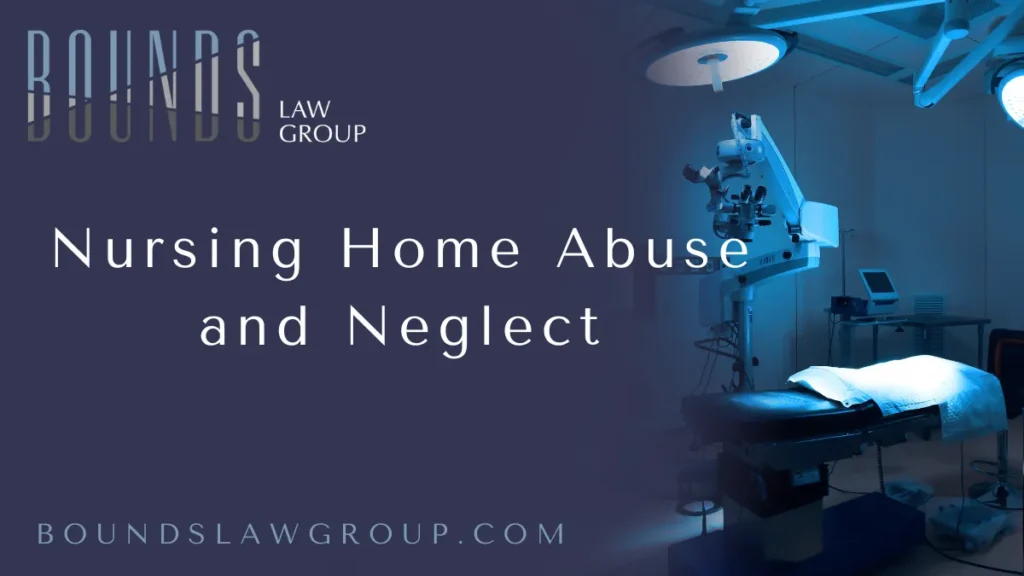
Nursing Home Abuse and Neglect
Understanding Nursing Home Abuse and Neglect in Florida
Florida Nursing Home Abuse and Neglect Lawyer
When you entrust a nursing home with the care of a loved one, you expect them to receive proper medical attention, compassionate treatment, and a safe environment. Unfortunately, many residents in Florida nursing homes suffer from abuse and neglect, leading to devastating consequences. If your family member has been a victim of nursing home abuse, you need a skilled Florida nursing home abuse and neglect lawyer to hold negligent parties accountable.
At Bounds Law Group, we fight aggressively to protect the rights of victims and their families. We have a proven track record of helping families secure the justice and compensation they deserve. If you suspect that your loved one is suffering from mistreatment in a nursing home, contact us today. Complete the free case evaluation form or call us now at 877-644-5122 to discuss your case.

Nursing Home Abuse and Neglect in Florida
Nursing home abuse occurs when residents suffer physical, emotional, sexual, or financial harm due to the actions or negligence of caregivers. Neglect is a form of mistreatment where the facility fails to provide necessary care, leading to serious health issues.
The most common types of nursing home abuse and neglect include:
- Physical Abuse: Hitting, pushing, or improperly restraining a resident.
- Emotional Abuse: Verbal threats, humiliation, or isolation.
- Sexual Abuse: Any non-consensual sexual contact or harassment.
- Financial Exploitation: Theft of money, assets, or unauthorized transactions.
- Medical Neglect: Failure to administer medication or provide proper medical attention.
- Malnutrition and Dehydration: Lack of adequate food and water leading to severe health complications.
- Poor Hygiene and Unsanitary Conditions: Unclean living spaces and failure to assist residents with personal hygiene.
If your loved one has experienced any of these forms of abuse or neglect, a dedicated Florida nursing home abuse and neglect lawyer at Bounds Law Group is ready to help you seek justice.
Signs Your Loved One May Be a Victim of Nursing Home Abuse
Many elderly residents are unable or afraid to report abuse and neglect, making it crucial for family members to recognize warning signs, including:
- Unexplained bruises, cuts, or burns
- Sudden weight loss or malnutrition
- Poor hygiene or bedsores
- Frequent infections or illnesses
- Fearful behavior or withdrawal from social interactions
- Unusual financial transactions or missing personal items
- Overmedication or untreated medical conditions
If you notice any of these warning signs, act immediately. Contact a Florida nursing home abuse and neglect lawyer at Bounds Law Group to investigate the situation.
Who Can Be Held Liable for Nursing Home Abuse in Florida?
Several parties may be responsible for nursing home abuse and neglect, including:
- Nursing Home Staff – Caregivers, nurses, or doctors who engage in or enable abuse.
- Facility Owners and Administrators – If they fail to implement policies that ensure residents’ safety.
- Third-Party Contractors – If external service providers contribute to the abuse or neglect.
- Pharmaceutical Providers – If improper medication leads to harm.
A skilled Florida nursing home abuse and neglect lawyer will thoroughly investigate the case, identify liable parties, and pursue maximum compensation for your loved one’s suffering.
Legal Rights of Nursing Home Abuse Victims in Florida
Under Florida law, victims of nursing home abuse have the right to seek compensation for:
- Medical expenses related to injuries or illnesses caused by neglect
- Pain and suffering endured due to abuse
- Mental anguish and emotional distress
- Loss of quality of life
- Wrongful death damages if a loved one dies due to nursing home negligence
Florida law provides strict regulations under the Nursing Home Residents’ Bill of Rights (Florida Statutes § 400.022). This law ensures that nursing home residents receive proper care and dignity. If a facility violates these rights, victims and their families can file a lawsuit with the help of a Florida nursing home abuse and neglect lawyer.
Steps to Take If You Suspect Nursing Home Abuse in Florida
If you suspect nursing home abuse, follow these steps to protect your loved one:
- Document the Evidence – Take photos of injuries, poor living conditions, or any signs of neglect.
- Report the Abuse – File a complaint with the Florida Department of Elder Affairs and the Florida Agency for Health Care Administration (AHCA).
- Seek Medical Attention – Ensure your loved one receives proper treatment for any injuries.
- Remove the Resident (If Necessary) – If the environment is dangerous, consider relocating your loved one to a safer facility.
- Contact a Florida Nursing Home Abuse and Neglect Lawyer – Legal action is essential to hold responsible parties accountable.
Bounds Law Group is ready to fight for your family’s rights. Complete the free case evaluation form or call us now at 877-644-5122 to get started.

Preventing Nursing Home Abuse: How Families Can Protect Their Loved Ones
While legal action is crucial in cases of nursing home abuse and neglect, prevention is always the best approach. Families play a significant role in ensuring their loved ones receive the care and respect they deserve. Here are some proactive steps you can take to prevent nursing home abuse before it happens:
1. Carefully Research Nursing Homes Before Placement
Before selecting a nursing home for your loved one, conduct thorough research by:
- Checking online reviews on platforms like Medicare.gov’s Nursing Home Compare tool.
- Visiting the facility multiple times, at different hours, to observe staff behavior and cleanliness.
- Speaking with current residents and their families about their experiences.
- Reviewing the facility’s inspection reports and history of violations on the Florida Agency for Health Care Administration (AHCA) website.
2. Stay Involved and Make Frequent Visits
Regular visits help prevent neglect and abuse by showing staff that your loved one has active family involvement. When visiting:
- Check for signs of distress or physical injuries.
- Observe the facility’s cleanliness and staff interactions.
- Engage with caregivers and ask about any changes in treatment or health conditions.
- Visit at unexpected times to get an accurate view of daily care standards.
3. Establish Open Communication with Your Loved One
Many nursing home residents fear retaliation if they report mistreatment. Encouraging open dialogue can make a significant difference.
- Ask direct but gentle questions about their care and treatment.
- Pay attention to changes in mood or behavior that may indicate distress.
- Provide them with a personal phone or emergency contact device in case they need to reach you.
4. Understand Your Loved One’s Legal Rights
Florida law provides strong protections for nursing home residents under the Nursing Home Residents’ Bill of Rights (Florida Statutes § 400.022). This law grants residents the right to:
- Be treated with dignity, respect, and privacy.
- Have access to medical care, social activities, and personal belongings.
- Voice complaints without fear of retaliation.
- Live in a safe and clean environment.
If you suspect these rights are being violated, consult a Florida nursing home abuse and neglect lawyer immediately.
5. Report Any Suspicions Immediately
If you notice red flags of abuse or neglect, take action right away:
- Contact Florida’s Elder Abuse Hotline at 1-800-96-ABUSE (1-800-962-2873).
- File a complaint with the Florida Agency for Health Care Administration (AHCA).
- Request a formal meeting with the nursing home’s administration to address concerns.
- Consult with an experienced Florida nursing home abuse and neglect lawyer to explore legal options.
Take Action to Protect Your Loved One
The best way to prevent nursing home abuse is to stay involved, informed, and proactive. If you believe your loved one has been mistreated, do not hesitate to seek legal guidance.
At Bounds Law Group, we are dedicated to protecting the rights of nursing home residents. Complete the free case evaluation form or call us now at 877-644-5122 to discuss your case with a trusted Florida nursing home abuse and neglect lawyer.
How a Florida Nursing Home Abuse and Neglect Lawyer Can Help
A knowledgeable Florida nursing home abuse and neglect lawyer will:
- Conduct a comprehensive investigation into the abuse claims.
- Gather crucial evidence, including medical records, witness statements, and surveillance footage.
- Work with medical experts to prove negligence.
- File a lawsuit against the responsible parties.
- Negotiate a fair settlement or take the case to court if necessary.
At Bounds Law Group, we have years of experience handling nursing home abuse cases. Our firm is committed to holding negligent parties accountable and securing the compensation victims deserve.
Contact a Florida Nursing Home Abuse and Neglect Lawyer Today
Your loved one deserves dignity, respect, and quality care. If they have suffered abuse or neglect in a Florida nursing home, don’t wait. Bounds Law Group is here to help you navigate the legal process and fight for justice.
Complete the free case evaluation form or call us now at 877-644-5122 to discuss your case with an experienced Florida nursing home abuse and neglect lawyer.
Sources
- Florida Department of Elder Affairs – Provides information on elder abuse reporting and senior care services in Florida. Visit Website
- National Center on Elder Abuse (NCEA) – A leading resource for research and advocacy on elder abuse prevention. Visit Website
- Florida Agency for Health Care Administration (AHCA) – Regulates healthcare facilities and investigates complaints about nursing home abuse. Visit Website
injury, sexual abuse, lawyer, personal injury, lawsuit, neglect, pain and suffering, nursing home abuse and neglect, patient, nursing home, psychological abuse, dementia, medication, law, negligence, disease, caregiver, hygiene, substance abuse, assisted living, nursing, abuse, risk, accident, weight loss, legal liability, dehydration, death, malnutrition, pain, complaint, elderly care, bruise, damages, ombudsman, wheelchair, failure, adult protective services, fear, pandemic, stress, assault, verbal abuse, medicaid, behavior, statute of limitations, pressure, physical abuse, court, accidents, nursing home negligence, nursing home neglect, abuse nursing home, abuse lawyer, truck accidents, crime, policy, therapy, world health organization, consent, oral hygiene, dignity, fraud, centers for disease control and prevention, physical restraint, fatigue, statistics, new york state department of health, new york city, law enforcement, email address, attention, health care, premises liability, suffering, medical record, punitive damages, weight, duty of care, plaintiff, health care quality, bleeding, disclaimer, confusion, safety, burn, turnover, frequency, trial, emergency, brain, parent, statute, wrongful death claim, personal injury lawyer, slip and fall, dog bite, fee, long island, evidence, standard of care, wound, the bronx, patient abuse, liability insurance, background check, witness, power of attorney, settlement, expense, jury, regulation, cause of action, new york metropolitan area, physician, product liability, staten island, attorney, abuse attorney, nursing home malpractice, nursing home lawyers, nursing home law, personal injury lawyers, discrimination, queens, financial compensation, evaluation, verdict, registered nurse, physical therapy, employment, compassion, punishment, corporal, duty, tort, spinal cord, advocate, negotiation, andrew cuomo, distress, grandparent, basic needs, fax, income, activities of daily living, document, wage, judge, violence, testimony, surveillance, percentage, construction, nutrition, theft, what is considered nursing home neglect, telephone number, malpractice, nursing home falls, nursing home lawyer, harassment, intimidation, nursing home reform act, hazard, illinois, cash, drug, vehicle
What is considered abuse or neglect in nursing home patient with dementia?
Abuse or neglect in nursing home patients with dementia occurs when caregivers fail to provide necessary care, leading to physical harm, emotional distress, or neglect of essential needs like hydration, nutrition, and hygiene, significantly impacting the patient's well-being.
How to report abuse or neglect in a Texas nursing home?
Reporting abuse or neglect in a Texas nursing home involves contacting the Texas Department of Family and Protective Services (DFPS) at 1-800-252-5400 or filing a report online. It's crucial to document any evidence and seek immediate assistance for the victim.
How do you prove negligence in a nursing home?
Proving negligence in a nursing home involves demonstrating that the facility failed to provide a reasonable standard of care, leading to harm. Key elements include identifying the duty of care, showing a breach of that duty, and linking it to the injuries suffered.
What is abuse vs neglect nursing home CT?
Abuse and neglect in nursing homes in Connecticut refer to intentional harm or mistreatment (abuse) and the failure to provide necessary care or services (neglect). Both violate residents' rights and can lead to serious consequences for vulnerable individuals.
How hard is it to prove nursing home neglect?
Proving nursing home neglect can be challenging due to the need for clear evidence and documentation of poor care. It often requires detailed records, witness testimonies, and expert opinions to establish a case effectively.
What is considered neglect in a nursing home?
Neglect in a nursing home refers to the failure to provide essential care and services that lead to harm or potential harm to residents, including inadequate medical attention, poor hygiene, malnutrition, and lack of supervision.
How do you prove neglect in a nursing home?
Proving neglect in a nursing home involves demonstrating that the facility failed to provide adequate care, resulting in harm or risk to the resident. This can be supported by evidence such as medical records, witness statements, and photographs of poor living conditions.
What evidence is needed to win a nursing home case?
The evidence needed to win a nursing home case includes medical records, witness statements, photographs of injuries, incident reports, and documentation of any prior complaints against the facility. This evidence helps establish the liability of the nursing home for neglect or abuse.
What are signs of nursing home neglect?
The signs of nursing home neglect include unexplained weight loss, poor hygiene, untreated medical conditions, lack of adequate supervision, and emotional distress in residents. Recognizing these indicators is crucial for ensuring the safety and well-being of loved ones.
How to identify abuse in nursing homes?
Identifying abuse in nursing homes involves recognizing signs such as unexplained injuries, sudden changes in behavior, poor hygiene, or emotional withdrawal. Families should be vigilant for these indicators and take immediate action if abuse is suspected.
What legal options exist for neglect victims?
The legal options for neglect victims include filing a personal injury claim, seeking compensation through a nursing home abuse lawsuit, and reporting the neglect to state authorities for investigation. Victims and their families can pursue these avenues to secure justice and accountability.
What common injuries indicate nursing home abuse?
Common injuries that indicate nursing home abuse include unexplained bruises, fractures, bedsores, frequent falls, and signs of malnutrition or dehydration. These injuries may signal neglect or physical abuse, warranting immediate investigation.
How to find a nursing home lawyer?
Finding a nursing home lawyer involves researching experienced attorneys who specialize in elder law and nursing home abuse. Look for local law firms, read client reviews, and schedule consultations to discuss your case and ensure you feel comfortable with their approach.
What guidelines protect nursing home residents?
The guidelines that protect nursing home residents include federal and state regulations ensuring their rights to safety, dignity, and care. Standards set by the Nursing Home Reform Act mandate appropriate staffing, proper medical treatment, and the right to be free from abuse and neglect.
How to document abuse in nursing homes?
Documenting abuse in nursing homes involves collecting evidence such as photographs of injuries, keeping detailed notes of incidents, and obtaining witness statements. Additionally, report the abuse to the facility management and local authorities to ensure thorough investigation.
What are the symptoms of elder neglect?
The symptoms of elder neglect include noticeable weight loss, poor personal hygiene, untreated medical issues, lack of adequate nutrition, and unsafe living conditions. These signs indicate that an elderly person may not be receiving the care and attention they need.
What steps to take after reporting neglect?
The steps to take after reporting neglect include documenting all relevant information, following up with authorities to ensure action is being taken, and seeking legal advice to understand your rights and potential next actions for protecting your loved one.
How can families support nursing home residents?
Families can support nursing home residents by maintaining regular communication, visiting frequently, advocating for their needs, and being attentive to any signs of abuse or neglect, ensuring that their loved ones feel valued and cared for.
What are the consequences of nursing home neglect?
The consequences of nursing home neglect include physical harm, emotional distress, and a decline in mental and physical health for residents. Victims may also experience increased medical costs and a diminished quality of life, affecting both them and their families.
How often are nursing homes inspected for abuse?
Nursing homes are typically inspected for abuse at least once a year by state agencies. However, additional inspections may occur in response to complaints or reports of suspected abuse.
What should you do if you suspect abuse?
If you suspect abuse, it's crucial to take immediate action. Report your concerns to the appropriate authorities, document all evidence, and consult a knowledgeable attorney to explore your legal options for protecting your loved one.
What resources are available for abuse victims?
Resources available for abuse victims include legal assistance from specialized attorneys, local support groups, hotlines for immediate help, advocacy organizations, and counseling services. These resources can provide vital support and guidance in navigating the aftermath of abuse.
How to navigate legal claims against nursing homes?
Navigating legal claims against nursing homes involves understanding your rights, documenting evidence of abuse or neglect, and consulting with an experienced attorney who specializes in this area to guide you through the process effectively.
What are the ethical standards for nursing homes?
The ethical standards for nursing homes include ensuring residents' dignity, providing safe and appropriate care, respecting individual rights, promoting autonomy, and fostering a compassionate environment. These standards aim to protect residents from abuse and neglect while upholding their quality of life.
How to approach a nursing home about concerns?
Approaching a nursing home about concerns involves communicating your observations respectfully and directly. Schedule a meeting with management to discuss your issues, ask questions, and seek clarification on their policies and procedures regarding your loved one’s care.
What training is required for nursing home staff?
The training required for nursing home staff includes procedures for patient care, safety protocols, handling medication, recognizing signs of abuse or neglect, and understanding residents' rights to ensure high-quality care.
How does emotional abuse manifest in nursing homes?
Emotional abuse in nursing homes manifests through behaviors such as verbal insults, intimidation, isolation, and manipulation. Victims may experience fear, anxiety, and feelings of worthlessness due to these harmful interactions and neglect of their emotional well-being.
What factors influence nursing home negligence cases?
The factors that influence nursing home negligence cases include staffing levels, staff training, facility conditions, resident health status, and documentation practices. These elements significantly impact the quality of care provided and may contribute to instances of neglect or abuse.
What does the law say about elder abuse?
The law regarding elder abuse mandates strict protections for older individuals, defining various forms of abuse—such as physical, emotional, and neglect—and imposes legal responsibilities on caregivers and nursing homes to ensure the safety and well-being of the elderly.
How to ensure a safe nursing home environment?
Ensuring a safe nursing home environment involves regular inspections, monitoring staff qualifications, fostering open communication with residents and families, and promptly reporting any signs of abuse or neglect. Advocacy and awareness are key to maintaining safety.
nursing home physical abuse




